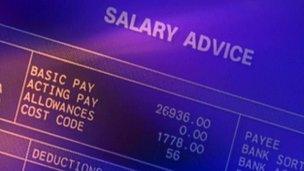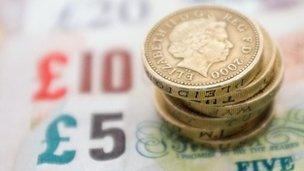Spending power: back to Iraq
- Published
Wind back the clock 10 years, to the shock and awe that began the Iraq war.
It was a time of international tension and domestic controversy. It was also a time of fast-rising earnings, not least if you worked in the public sector.
Male part-time earnings in the public sector are a startling example: up 29% over the decade. Women's part-time earnings were up 21%. Yet part-time work in the private sector rose only 4% for men and 5% for women.
Ten years on from shock and awe, and if you're the average person on average pay, your earnings may look bigger, but your spending power has gone precisely nowhere.
It rose up to 2009, and it has since slipped back.
Of course, the average person is also more likely to be unemployed.

Average earnings have fallen from £12.25 to £11.21 per hour between 2009 and 2012
But if you take those in work in the UK as a guide, real terms rose by 1.6% on average for each year between 2002 and 2009. Since then, average earnings fell from £12.25 per hour to £11.21 (at comparable 2012 prices).
That leaves aside the impact of tax and benefit changes, which are squeezing many household budgets harder. And that squeeze on spending power looks set to remain the trend, according to the guidance from the Bank of England, external, with inflation on track to head back over the 3% mark later this year.
'You've had it'
Clearly, not everyone is in the same job they were in 10 years ago. Many have moved up the career ladder, though not necessarily rising up the earnings ladder as fast as they might have expected. Moreover, averages mask the divergence of the highest paid from the lowest, which is becoming an increasingly hot topic.
But these figures, contained in an important publication from the Office of National Statistics, external earlier this week, can teach at least one important lesson about what's happening in the economy as a whole.
And it's not pretty. It's the basis on which the Labour leadership has this week set out the battleground on which it wants to fight the next Westminster election.
The opposition is playing on the real prospect of declining living standards being a sustained problem. In place of the message 'You've Never Had It So Good' from Harold Macmillan in the 1950s, the warning now is a subbed down version, leaving only the words 'You've Had It'.
Man vs machine
Whether that has become an ingrained, persistent problem depends on what lies behind the fall in earnings. It may be because people in work have taken a temporary pay cut in order to get through hard times, hoping they'll return to the rising pay trajectory when the downturn and austerity is over.
Or it may be because the workforce has changed, in that better paying jobs have been stripped out, and Britain's work profile is being shaped by retaining and creating lower paying jobs. It's probably a bit of both.

The median income for the self-employed fell by 16%
As the ONS points out, cheaper labour is an incentive for bosses to use labour where otherwise investment in capital could boost output.
So it's an incentive not to invest, at a time when it's not that easy to fund investment anyway.
If that's the way the economy's going, it means worsening productivity. Investment is key to ensuring workers boost their output per hour. Other countries are doing so, and without investment and ever-improving productivity, firms become less competitive and Britain's economy falls behind.
Cheap cuts
We don't yet know if that's definitely happening, but it's clear that there's a problem with Britain's productivity. And one element of the labour market which we do know has changed is the boost to the number of self-employed people.
The ONS figures are particularly stark for them, and volatile. Median real income from self-employment fell between 2007-8 and 2010-11 by 16% for the UK as a whole. In London, it fell by a third.
That may be explained by more people coming into self-employment without the work and wages being there for them, dragging the average down. Self-employment, in that case, is masking under-employment and unemployment.
The other explanation is that those already in self-employment as the downturn hit were the ones who lost out on work contracts while bosses prioritised the retention of their employed staff.
It's quite a bleak outlook. With squeezed real spending power, and unless exports can be boosted, demand in the economy diminishes.
And as we're seeing from retail figures this week, people focus their spending power more on what they need, starting with food.
In Britain more than its neighbours, we were already used to food being cheap, sometimes improbably and impossibly so.
Other than falling living standards, the other stand-out story of the past week has been about the consequences of brutally tough competition in food retailing, allied to consumer choices about food being shaped by price more than quality.
Squeezed real incomes mean cheaper cuts of meat, and if not properly policed, cheaper animals being slaughtered.
You can also comment or follow Douglas Fraser on Twitter: @BBCDouglsFraser